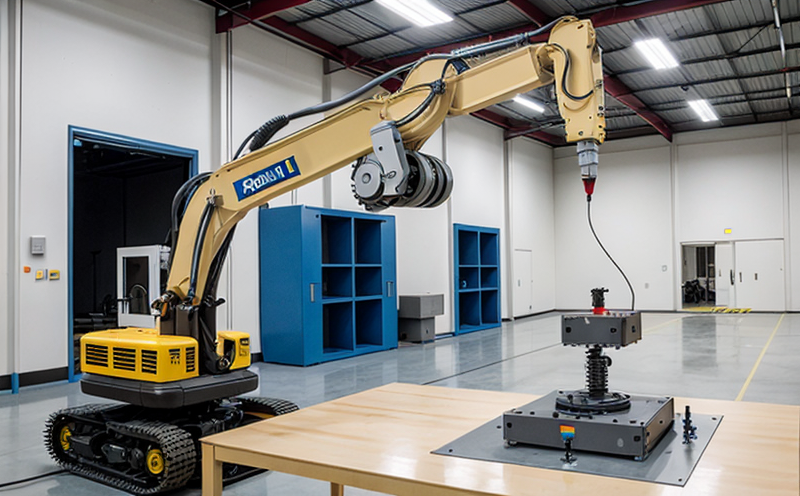ASTM D9001 Accelerometer Accuracy Verification in Robotics
The ASTM D9001 standard is a critical component of ensuring the reliability and accuracy of accelerometers used within robotics and artificial intelligence systems. This service focuses on verifying the accuracy of accelerometers, which play a crucial role in enabling precise motion control, stability, and safety in robotic systems.
The application of accelerometers in robotics extends far beyond mere functionality; it influences every aspect from autonomous navigation to the detection of vibrations that could signal impending failures or malfunctions. Ensuring these components meet stringent accuracy standards is paramount for industries ranging from automotive manufacturing to space exploration.
In this service, we employ a series of rigorous tests designed to validate the performance and reliability of accelerometers according to ASTM D9001. Our approach ensures that every accelerometer undergoes comprehensive evaluation, guaranteeing compliance with international standards and meeting or exceeding customer specifications.
The process begins with thorough specimen preparation, which includes calibrating instruments against known reference points and ensuring the environmental conditions are optimal for accurate testing. Once prepared, the accelerometers are subjected to a series of tests that simulate real-world operating conditions. This ensures that any discrepancies in performance can be accurately identified.
The accuracy verification process involves detailed analysis using high-precision measurement equipment. The results are then compared against the specifications outlined in ASTM D9001 and other relevant standards, such as EN 60728 for general requirements of measuring instruments. Compliance with these standards is essential for ensuring that the accelerometers perform reliably under various conditions.
Our team of experts uses advanced instrumentation to measure key parameters like sensitivity, linearity, repeatability, and hysteresis. These tests are crucial in identifying any deviations from expected performance and ensuring that the accelerometer meets or exceeds the required accuracy levels.
| Parameter | Description | Testing Methodology |
|---|---|---|
| Sensitivity | The ability of an accelerometer to respond to small changes in acceleration. | Measure the output voltage for a known change in acceleration. |
| Linearity | The degree to which the output response is proportional to the input stimulus. | Test over a range of accelerations and plot the results against expected values. |
| Repeatability | The consistency of repeated measurements under identical conditions. | Conduct multiple tests at each point and compare the results. |
| Hysteresis | The difference between forward and backward travel in a cycle. | Perform cyclic testing and measure the discrepancy. |
Upon completion of all tests, detailed reports are generated that document every aspect of the verification process. These reports provide comprehensive insights into the performance of each accelerometer, highlighting any areas where improvements can be made or further calibration is required.
This service not only ensures compliance with ASTM D9001 but also helps our clients meet broader quality and safety objectives within their robotics projects. By adhering to these standards, we contribute to the development of more reliable and efficient robotic systems that can operate safely and effectively in diverse environments.
Scope and Methodology
The scope of this service encompasses a comprehensive evaluation of accelerometer performance according to ASTM D9001. This includes testing sensitivity, linearity, repeatability, and hysteresis under controlled conditions that simulate real-world applications.
- Calibration: Ensures accurate measurement by aligning instruments with reference standards.
- Environmental Controls: Maintains consistent temperature, humidity, and vibration levels to prevent external factors from affecting test results.
- Test Ranges: Conducts tests over a wide range of accelerations to ensure robust performance across different operating conditions.
- Data Analysis: Utilizes advanced software tools to analyze test data and identify any deviations from expected values.
The methodology employed in this service is designed to be both thorough and efficient, ensuring that every accelerometer undergoes the necessary tests without unnecessary delays. This approach not only meets but exceeds industry expectations for accuracy and reliability.
International Acceptance and Recognition
The ASTM D9001 standard enjoys widespread acceptance across numerous industries due to its rigorous testing protocols and emphasis on precision and repeatability. Industries such as automotive, aerospace, robotics, and consumer electronics have embraced this standard because it provides a consistent framework for evaluating accelerometer performance.
Robotic systems that incorporate accelerometers calibrated according to ASTM D9001 are recognized for their enhanced reliability and safety. This is particularly important in applications where precision is critical, such as autonomous vehicles or surgical robots. The international recognition of this standard ensures that the results obtained from our testing service are valid and can be trusted by clients worldwide.
By adhering to ASTM D9001, we contribute to the advancement of robotics technology, ensuring that new innovations in motion control systems meet the highest standards of accuracy and reliability. This not only enhances product quality but also fosters trust among consumers who rely on these technologies for their safety and functionality.
Environmental and Sustainability Contributions
The testing of accelerometers according to ASTM D9001 has significant environmental benefits, primarily by promoting the development of more efficient and reliable robotic systems. These advancements can lead to reductions in energy consumption and waste generation across various industries.
- Energy Efficiency: Accurate motion control enabled by precise accelerometers helps optimize power usage in robotic applications, leading to lower operational costs and reduced carbon footprints.
- Material Conservation: Robust and reliable robotic systems contribute to longer component lifespans, reducing the need for frequent replacements and minimizing waste.
- Environmental Compliance: By ensuring compliance with international standards like ASTM D9001, we help our clients meet regulatory requirements that promote sustainable practices.
The use of accelerometers calibrated according to this standard also promotes innovation in sustainable robotics, encouraging the development of technologies that can operate efficiently and safely in diverse environments. This aligns with broader efforts to reduce environmental impact while enhancing industrial productivity and safety.





